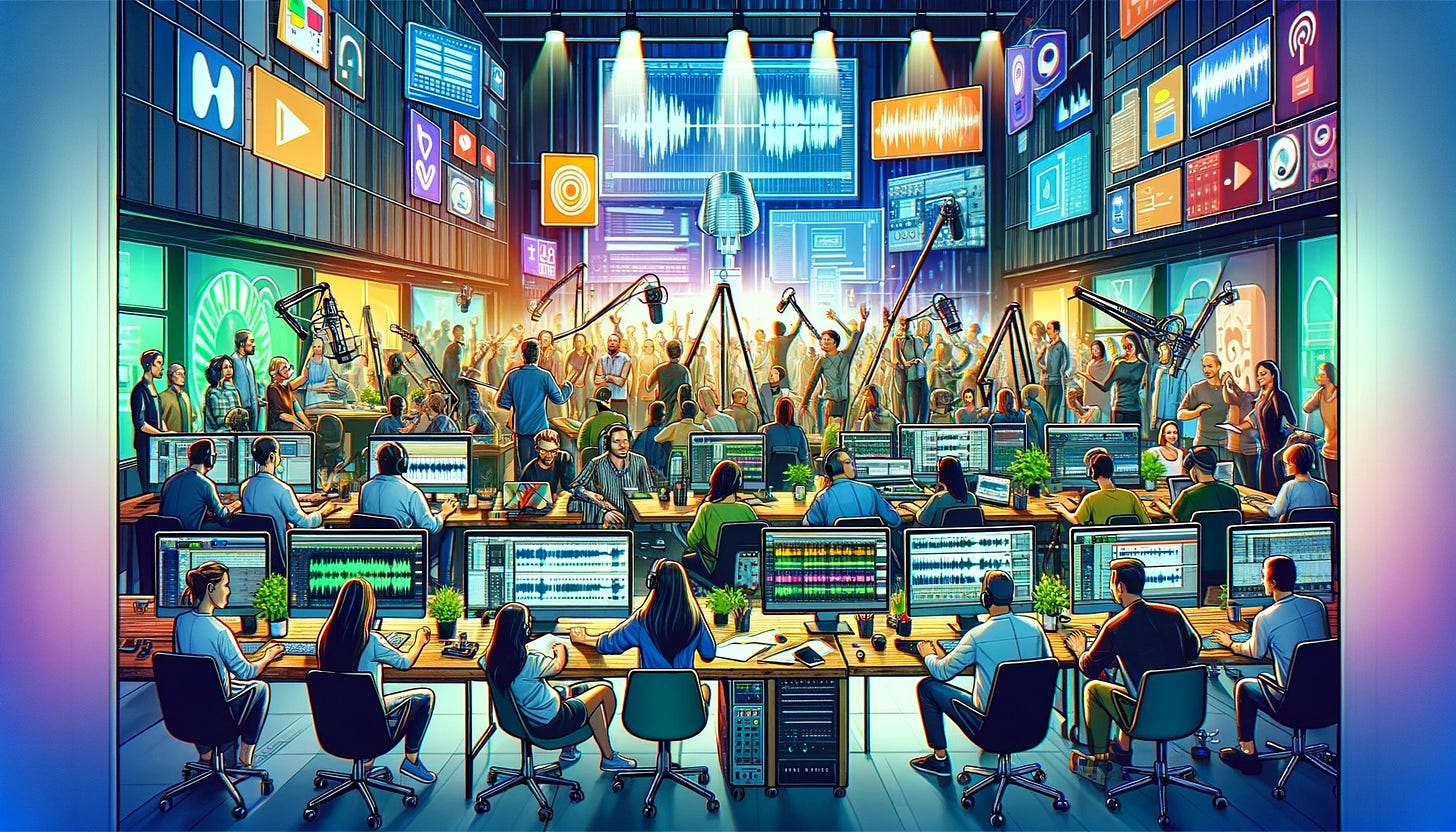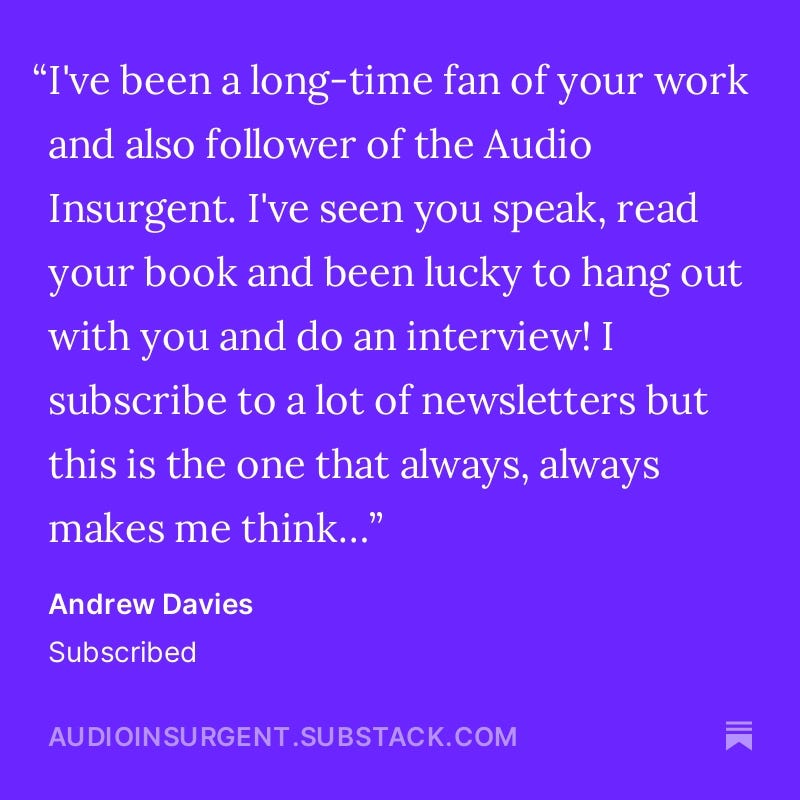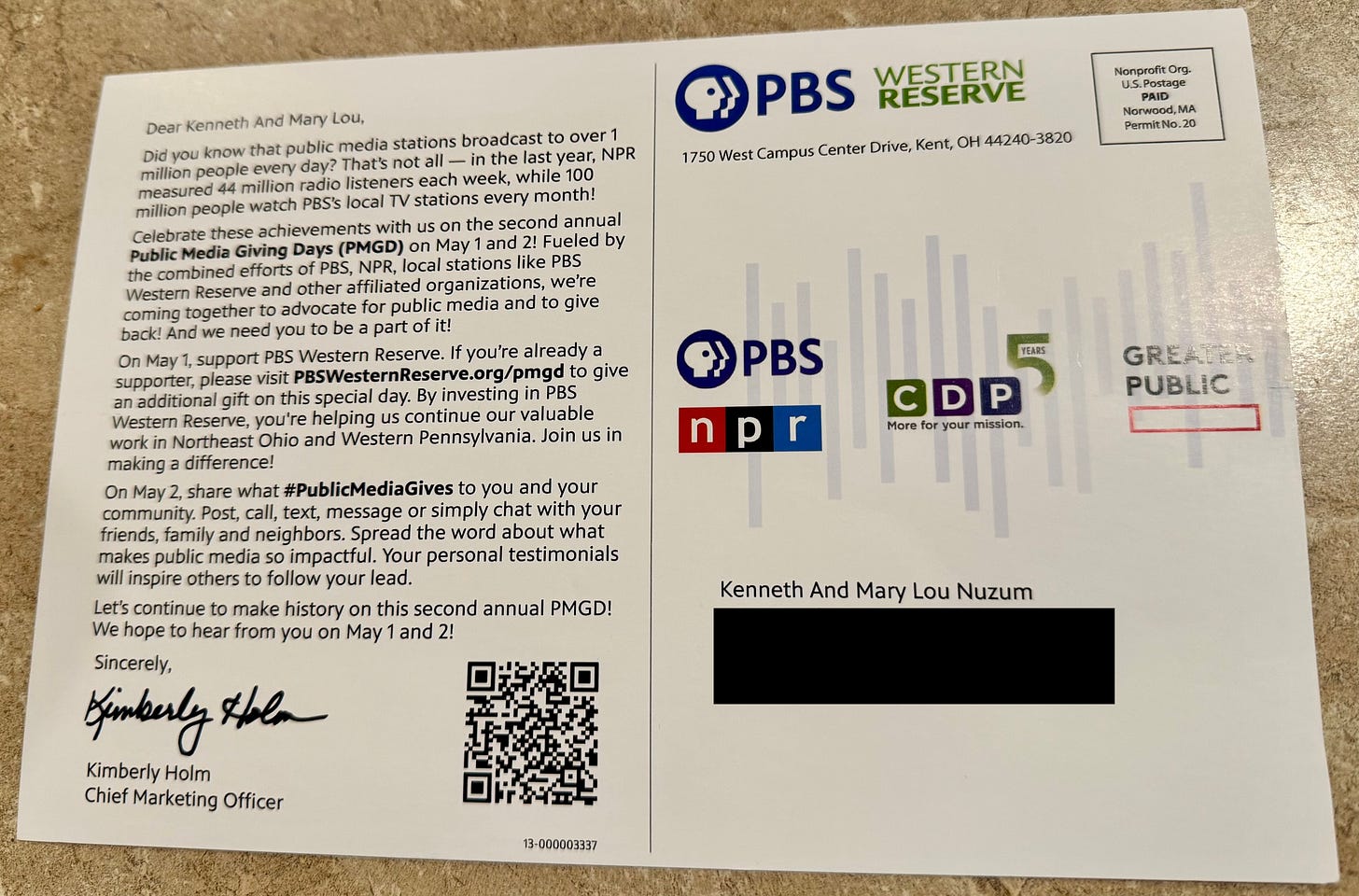The Half-Life of Your Production Skills Is Probably Less Than Three Years
It’s easy to point at companies that are stuck in place, but what about the skill sets of our workers?
Welcome to Dispatch #61 of The Audio Insurgent.
Sorry it has been a bit. As I’ve mentioned, I have a big show coming out on May 1st. Lots of work to get it finished. So let’s jump in…
[TODAY’S MAIN THING: THE HALF-LIFE OF YOUR PRODUCTION SKILLS IS PROBABLY LESS THAN THREE YEARS] I can always tell an interview is going to be great when I start taking notes.
Not notes to guide an edit, but notes of what this person says because they are sharing ideas I want to use in my life. That’s happened a number of times recently with our show with Emerson Collective, Almost There, and also with If/Then that we produce with Stanford Graduate School of Business. A guest will say something super interesting and profound, and I make note of it so that I can mentally come back to it when I'm not busy recording an episode.
The most recent example happened last week, when we were recording an episode of Bubble Trouble, this time with guest Bill Raduchel. Bill is a unique kind of polymath, having worked in everything from economics to computer programming to consulting with world governments. During a part of the conversation about why governments have trouble innovating and regulating tech, Bill said “I think professions in the meantime to obsolescence or the half-life of professional training is probably five years now.” Meaning that if you come out of school or training with cutting edge skills in the latest research, technologies, best practices, tools, and ways of working in your field--what you know will be completely outdated in five years. If you don’t refresh those skills, you will be a dinosaur in roughly the time between World Cups.
This was really fascinating to me and I decided to fact-check it a bit. It turns out that not only is Bill correct, but he was probably being generous. I came across a Harvard Business Review article that basically says the same thing that Bill said, but also theorized that for tech workers, the half-life for their jobs is as short as 2.5 years. And this was written before the AI boom. Arguably, in AI, an unaugmented skills set could be outdated in a year.
But let’s think about how this applies to our audio world: radio and podcasting.
Radio, well, I think most of radio, especially commercial radio, has been stuck in gear since the Telecommunications Act was signed in 1996. It is hard to come out of school with a fresh state-of-the-industry set of skills when fewer and fewer colleges offer specific radio and broadcasting majors anymore (instead sandwiching some audio coursework in broader communications programs) and the industry itself seems so resistant to any kind of change that doesn’t fall under the banner of “optimization.”
Podcasting, and digital audio production more broadly, is where I really see the truth of this profoundly. [con’t below]
Be like Andrew.
Andrew is a long-time reader and new supporter of The Audio Insurgent.
There are many very good places to hear today’s news about the podcasting and spoken-word industry. Here, I’m trying to do something different–create a space to understand several layers deeper, why things happen, and what the implications will be. This is a place for thought and analysis…plus my take on what it means.
If this is valuable to you, you can make sure it comes to you at least twice a month–and be among the first to read it–for as little as $5.
Andrew did it. And so can you.
I think back to when we started Magnificent Noise in 2019 and what our workflow was then compared to now. Back then, barely five years ago, recording a remote guest often involved asking them to travel to a recording studio (or you would travel to them) and set up a mix-minus between that studio and the one where your host sat (note that both these studios cost $200+ an hour each). Then, after receiving the interview audio via file transfer, you would often send it out for logging and/or transcription (at $1.50 per minute), then import it into Pro Tools (or Hindenburg or Audition or whatever you used) and get ready to edit. And, of course, you’d need to have sufficient editing skills and knowledge of Pro Tools.
Today, again, just a handful of years later, between Riverside, Squadcast, Zencastr, and Descript--all of which replace some or all of the above steps--you bypass most of the time and effort involved with the above process, as well as more than 90% of the cost, and it is more accessible to more creators and editors.
The new narrative series I mentioned that’s coming out next month--my collaborator lives in Melbourne, Australia. His ability to host interviews and work collaboratively on audio recording and editing would have been cost-prohibitive if not logistically impossible just a few years ago. Now it is no different than someone who works in my office (except for the 14 hour time difference).
While every new change is exciting, it also can create a fissure between the current state of the art and the skill set of many creators.
This is an argument I have with many Magnificent Noise staffers, many of whom have been using Pro Tools for audio editing since they started in the industry, whenever I ask them to do something in Descript. Our current default workflow at Mag Noise is often (but not always) to record in-person (or via Riverside or Squadcast), then we import into Descript to do the first few edits. Then, when it is ready for fine cutting, mixing, and sound design, we move it over to Pro Tools.
Our producers will grumble and occasionally ask if they can cut something in Pro Tools instead, since that’s what they are used to. Or they ask to do it when they are in a hurry and need to cut in a familiar software environment where they feel they are fastest and most comfortable. I often push back and tell them that they need to force themselves to use new tools--that is how you learn them and how you build the skill to work in them quickly.
The line I often say, which often ends the argument, is “Look at it this way, your next job will expect that you’ll know how to use Descript fluidly–and whomever you are competing with to get that job will know it better than you do now. So be glad you have the opportunity to learn.”
To help them, I periodically do workshops with a handful of them to teach them ways to use Descript, as well as showing them new features, how to use them, and what “features” to avoid.
I see another wave of this happening now with video recording and editing skills.
We are just about to install a video recording suite in the Magnificent Noise offices. While we are and will remain an audio-first company, almost every new project we are working on either wants to be able to offer video versions of episodes and/or have some video assets to use for promotion. We’re spending a significant amount of money to install this even though our staff don't really know how to record or edit video.
Yet.
We plan on teaching them. The people we’ve hired to design and install the video capture equipment are also going to train our staff. We’re also planning to use a combination of freelance editors as well as train up our staff to be able to do basic edits like they do now for audio. Just like I don’t expect every producer to be able to sound design and mix audio episodes, I don’t expect our team to be able to do a fine cut of a video either, but they should be able to establish an editorial POV and make editorial edits on both formats.
And even though we plan to provide training and support, we also have set the expectation that they need to put in some independent effort as well. I’ve told several of them that they can even use work time, but they need to experiment around, try, fail, get frustrated, and figure it out.
That's how I’ve done it. I’m the person on our staff who was first to embrace Descript and am the person the staff comes to with questions or problems. No one taught me. I just imported some audio files, watched a few tutorial videos, and just kept frustrating myself going at it over and over again until I figured out how to make it do what I wanted it to do.
I’m doing the same thing now with video. We recently did an experiment where we brought in a crew to do a three-camera shoot in our office and recorded a podcast episode. That weekend I took all the gigabytes of video footage home and...basically spent the weekend frustrated as all get out: crawling through Premiere Pro, watching dozens of YouTube videos trying to figure out how to do what I wanted, and after an embarrassing number of hours, came out with a full edit using the three-cameras and audio we recorded.
I know that I need to learn this so that I can help my team learn this. So I just forced myself to do it.
In the HBR article I mentioned above, they describe this process as “reskilling”—taking a skilled workforce and updating their skills to match the evolution of the business needs.
For those of you who are leaders or managers--is your organization using the same processes, tools, and ways of working you were five years ago? Then you are behind--today. How can you expect to compete when your teams are behind the ball from the minute the idea leaves the whiteboard? What have you identified as the skills and tools they need to know today? And how about tomorrow? And are you providing them not only with those tools, but with the training to use them at the level you need to be efficient and competitive?
If you are a ground-level creator--same question: are you using the same platforms, tools, and ways of working that you were...even three years ago? Then you are behind. Someone is coming up behind you that learned these skills in high school and can run laps around you. You will need fresher skills to get a new job, so why not master them now? And while it would be great to wait for your employer or boss to offer you training, it will never be enough and it will never come fast enough. If you want to be competitive, you need to take the initiative to educate yourself and learn on your own. And it doesn’t need to be completely alone, there are so many great YouTube videos to help you learn and master just about every platform and tool audio professionals need now—for free. And it doesn’t take a tremendous amount of time. If you just dedicate 2 or 3 hours of your week to learning something new, you will never find yourself behind.
With all the lay-offs in audio this last year and all the people looking for work, I’ve noticed a surprising number of them, like a majority of them, are caught on the wrong side of this equation. They come out of a job knowing the tools and skills they needed for their old job--but not what will be expected of them for a new job. So they end up scrambling so they can walk into an interview and confidently say they have worked with Descript or Final Cut or whatever. Mind you, they don’t have professional projects in their portfolio using these skills, but they can wobbly function in them. That’s not the best look.
Wouldn’t it be better to put in a small effort to be ahead of that when the time comes?
Plus, learning new things is fun--and it helps you understand your work better overall.
[TODAY’S OTHER THING: GIVE US MONEY…PLEASE!!!] I was visiting my parents in Ohio last week and I noticed this card in their mail.
If it’s hard to read, this is what it says:
Did you know that public media stations broadcast to over 1 million people every day? That's not all — in the last year, NPR measured 44 million radio listeners each week, while 100 million people watch PBS's local TV stations every month!
Celebrate these achievements with us on the second annual Public Media Giving Days (PMGD) on May 1 and 2! Fueled by the combined efforts of PBS, NPR, local stations like PBS Western Reserve and other affiliated organizations, we're coming together to advocate for public media and to give back! And we need you to be a part of it!
On May 1, support PBS Western Reserve. If you're already a supporter, please visit PBSWesternReserve.org/pmgd to give an additional gift on this special day. By investing in PBS Western Reserve, you're helping us continue our valuable work in Northeast Ohio and Western Pennsylvania. Join us in making a difference!
On May 2, share what #PublicMedia Gives to you and your community. Post, call, text, message or simply chat with your friends, family and neighbors. Spread the word about what makes public media so impactful. Your personal testimonials will inspire others to follow your lead.
Let's continue to make history on this second annual PMGD!
We hope to hear from you on May 1 and 2!
Even though I write about some of the bigger issues in public radio from time to time, it isn’t a part of my every day world anymore. But I have read some articles about the struggles many stations are having with memberships: both maintaining and growing the number of givers as well as total dollars coming into stations and organizations.
When I saw this card, it really helped explain one reason why.
Besides containing a number of factual errors, this card pretty much ignores everything public media has learned over the last 30 years about the “customer journey” someone takes from being a public media consumer to being a public media giver or to giving multiple donations.
It is centered on the needs of the organization, rather than the needs of the audience. It fills itself with impenetrable jargon, brands listeners/viewers don't know or care about, and information that is wholly irrelevant to a successful fundraising ask. The entire campaign is centered around Public Media Giving Days--which is a thing to stations, not viewers/listeners--and no viewer or listener is ever going to care about Public Media Giving Days (let alone even think about what “public media” really means or is).
If this organization gets two dozen contributions after sending thousands of these cards, I’d be shocked.
A message that focuses on the value the audience gets from your programming? One that talks about how crazy the world is and how their station can be depended on to help sort through world and local events, understand the how and why of what’s happening, help them make sense of it, and perhaps even provide an intellectual oasis to get away from the craziness every once in awhile? That message wins. Every. Time.
And worst of all, this card is actually teaching its recipients something: it is teaching them to ignore what the station says to them. After dismissing this, as well as some other off mark messages to come in the future, how long until they get annoyed when they see mail coming from their station?
Many times, people make things more complicated than they need to be. Often those who are successful ignore the impulse to make things complicated and stick to the clear, precise, and simple.
Gifts come because viewers and listeners value programming.
Value is driven by consumption of that programming. The more they listen or watch, the more likely they are to give.
Consumption is driven by quality and distinction.
Want more listeners or viewers to make contributions? Be better.
Be fucking better.
Be better than anyone else.
Be essential. Not by your standard, but by theirs.
Your audience will see that.
They will appreciate it.
And when you ask, they will support you.
It doesn’t need to be any more complicated than that.
So...did my parents respond? Did they read that it was Public Media Giving Days and scan the QR code to make a donation?
They never even made it to the message.
My parents were too busy enjoying time with their grandson to notice me noticing their mail. Nor did they see me observing what happened to this card. It was actually flipped over to the other side, which had a colorful graphic declaring "It's Public Media Giving Days on May 1 and 2." My dad took about a quarter of a second glance at it as he swept it up and put it in the recycle pile.
[CAN WE TALK ABOUT SOMETHING ELSE PLEASE?] The new narrative series I keep mentioning? I believe next time I’ll be able to share some info and the trailer. What’s it about? Here is a clue.
Okay, that’s it for today.
Thousands of people read this newsletter without even a free subscription. If this was forwarded to you or you read this online, would you mind subscribing?
If you are a regular reader of The Audio Insurgent, I hope you’ll consider doing your part by supporting this work with a small donation. And if that’s too much, you are also always welcome to buy my book or (even better) buy me a beer.
Make great things. I’ll be listening.
--Eric






